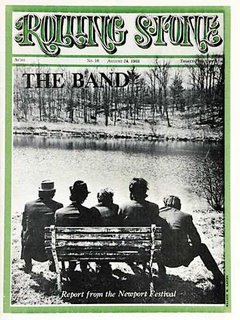Monday, May 29, 2006
the kids, they love the jon dee graham

jon dee smokes american spirit blue cigarettes. he smokes a lot of them. his songs, which cover a lot of ground, starting in dark corners, swelling to majestic bluffs, and receding back into the crevices of battered hearts, are sometimes too long for jon dee to wait until they are done to blaze up another smoke. his voice sounds like cancer. it's deep and gravelly, and it rumbles over lyrics like a mudslide. it's changed a lot since his days with the true believers. it's gotten a little deeper, and a little slower, but it commands attention and demands respect. maybe that's why my four year old boy loves to listen too him. "his voice is scary daddy," he told me one night while listening to "the great battle." "he sounds like a bad man," he said. "but he's a good man isn't he?" he asked. i reassured him that you could not determine the character of a man by his vocal stylings, but i did let him know that as far as i was concerned, jon dee graham is a wonderful gift.
Tuesday, May 09, 2006
why the band is the band

what makes a band? the dictionary reads that a band is "a group of people who have a common interest or purpose." the dictionary elaborates and says that a band is "a group of musicians who play together, in particular." i argue that a band is simply community. community is defined as "a group of people living in one place, esp. one practicing common ownership." so what would allow a group of musicians to declare themselves not only a band, but "the band"? and how would a group of musicians playing together, in particular, come to define what it meant to play in a band, or better yet, the band?
the genesis of the band was that of a backup band. in the late 50's, ronnie hawkins took his band, the hawks, from the american south to toronto, canada, where they played juke joints, bars, concert halls and the like. they built up such a following that ronnie hawkins and the hawks were often called the candadian version of elvis, scotty and bill. eventually, all of the hawks except one, levon helm, were changed out for canadian musicians. when all the dust had settled, the hawks comprised of helm, garth hudson, robbie robertson, rick danko, and richard manuel. a rift began to form between the outgoing, show-stealing, ego centered (according to some) ronnie hawkins, and the band. hawkins soon found himself the odd man out in his own creation.
shortly after the disintegration of ronnie hawkins' rock-and-roll outfit, the surviving members of the hawks, were pegged to back up bob dylan in his controversial movement towards electrified folk music. obviously in the early sixties, there were few individual voices quite as loud as dylan's, so the band took him up on his offer, and became synonymous with the troubadour's metamorphosis, touring behind the legend and giving a new interpretation to his songs. dylan, so accustomed to playing by himself, challenged the band to follow his improvisational and spirit inspired meanderings. dylan and the band were on the same page in some of the founding moments of modern rock-and-roll. after their rumored recordings together were confirmed by bootlegged copies of what eventually was released as "the basement tapes," the band were primed to strike out on their own.

the band released their first record as the band, "music from the big pink" (named for the house where "the basement tapes" were recorded) under nobody's leadership but their own. bruce eder of the all music guide wrote that "it was as though psychedelia, and the so-called british Invasion, had never happened; the group played and sang like five distinct individuals working toward the same goal, not mixing together smoothly. there was a collective sound to "the band," but it made up five distinct individual voices and instruments mixing folk, blues, gospel, r&b, classical, and rock & roll." literally, "music from the big pink" defined community. they were a group of people, all living together in the same place, with common ownership over the music.
all of the members took part in writing the music. they were not lead by anyone except themselves. if one of the members could have been pointed to as the lead man it would have been robertson, who did not sing the very songs he wrote. vocally, the band did not use harmony as much as they used discordance. at any given moment, one could make out the gruff drawl of helm, the pining beauty of manuel, or the subtle sweetness of danko. it was not as if they homogenized their style to achieve a singular purpose, but instead, they celebrated their differences to bring impact.
at one point in their lives, every member of the beatles went on record as saying that they wished that they were a member of the band. in retrospect, it is easy to see that john lennon and paul mccartney would have been attracted to an atmosphere where collaboration did not necessitate compromise. to be fair, creative differences enacted their damage to the band the same way it does to most bands. eventually, the band evolved into a collective of individuals who did not take common ownership, and whose differences became too much for them to collectively overcome. but for a few brilliant years, we were given a glimpse of pure community and a definition of what it meant to be part of a band.
john fahey - "the transfiguration of blind joe death"

this record from 1965 is a sterling example of what the late fahey described as "american primitive music." it is a finger-picking bible of sorts, and has been the inspiration to an unlikely circle of musicians, including thurston moore, howe gelb, cul de sac, and others. fahey twists hillbilly music, acoustic blues, jazz, and ragtime, to form a sculpture all his own. if ever there was an instrumental record that revealed so much about the character of the musician, this is it. fahey puts sounds to irony, sarcasm, desperation, bitterness, and joy.
an interesting side note: the album cover was featured prominently in stanley kubrick's film "a clockwork orange." look for it.
Friday, May 05, 2006
seeing by jose saramago


this is a companion piece to the portuguese nobel prize winner's earlier work "blindness." his sparse and simple approach to telling stories absolutely blind sides you with his complicated insight. this book is a political fable that tells the story of a country's election mishaps, and ensuing isolation. many have called saramago a modern day kafka. it would help to read "blindness" first, but not essential.


